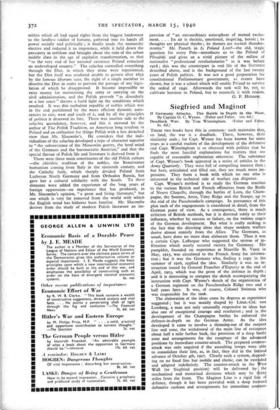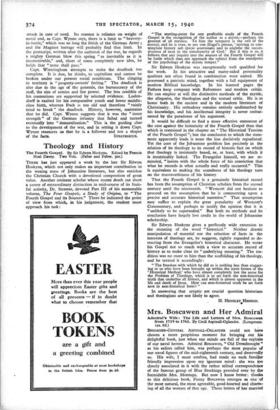Siegfried and Maginot
If Germany Attacks. The Battle in Depth in the West.
8s. 6d.)
THESE two books have this in common : each maintains that, on land, the war is a deadlock. There, however, their similarity ends ; for Capt. Wynne has been known for some years as a careful student of the development of the defensive and Capt. Wintringham is so obsessed with politics that he finds the most fanciful explanations for matters that are capable of reasonable explanation otherwise. The substance of Capt. Wynne's book appeared in a series of articles in the Army Quarterly. They were full of compelling interest then ; but here, articulated and filled out, they are much more, im- pressive. They form a book with which no one who is interested in the technical side of warfare can dispense.
Capt. Wynne's method is to study the German reaction to the various British and French offensives from the Battle of Neuve Chapelle, through the battles of Loos, the Cham- pagne, the Somme, Arras, Vimy Ridge and the Scarpe, up to the end of the Passchendaele campaign. In pursuance of this plan each of the engagements is considered in detail, from the German point of view. As a consequence, there is much criticism of British methods, but it is directed solely to their influence, whether by success or failure, on the various stages of the German development. But what is really striking is the fact that the directing ideas that shape modern warfare derive almost entirely from the Allies. The Germans, as usual, have done no more than elaborate them. Thus it was a certain Capt. Laffargue who suggested the system of in- filtration which nearly secured victory, for Germany. His pamphlet, founded on experience at Neuville St. Vaast in May, 1915, was circulated to the French Army for informa- tion ; but it was the Germans who, finding a copy in the summer of 1916, applied the idea. Similarly it was an in- struction issued by General Franchet d'Esperey at the end of April, 1915, which was the germ of the defence in depth ; and it is interesting to compare the sketch accompanying the instruction with Capt. Wynne's sketch of the organisation of a German regiment on the Passchendaele Ridge two and a half years later. It was, of course, Colonel Swinton who was responsible for the tank.
The elaboration of the ideas came by degrees as experience suggested ; but it was mainly shaped by Lieut.-Col. von Lossberg, a man not only unusually responsive to ideas but also one of exceptional courage and resolution ; and in the development of the Champagne battles he enforced the defence-in-depth on the German Army. As the idea developed it came to involve a thinning-out of the outpost line and zone, the withdrawal of the main line of resistance about half a mile farther back, the provision of a deep battle zone and arrangements for the recapture of the advanced positions by immediate counter-attack. The prepared counter- attack was only required if the assaulting troops were 'able to consolidate their line, as, in fact, they did in the limited advance of October 4th, 1917. Clearly such a system, depend- ing on no fixed line but mobile and elastic, can be exte ded and adapted indefinitely. The counter-attack in the est Wall (or Siegfried position) will be delivered by the mechanised and motorised divisions which may be irty miles from the front. The Maginot Line is a rigid e of defence, though it has been provided with a deep forrard defensive cushion and arrangements for immediate counter- . attack in case of need. Its essence is reliance on weight of metal and, as Capt. Wynne says, there is a limit to " bravery- in-battle," which was so long the fetish of the German Army ; and the Maginot barrage will probably find that limit. In the postscript, written after the outbreak of the war, he regards a mighty German blow this spring " as inevitable as it is inconceivable," and, short of some completely new idea, he holds that " none shall pass."
Capt. Wintringham attempts to make the deadlock too complete. It is due, he thinks, to capitalism and cannot be broken under our present social conditions. The clinging to territory is " property-owners' feeling." The deadlock is also due to the age of the generals, the bureaucracy of the staff, the size of armies and fire power. The less credible of his contentions are supported by selected evidence. Luden- dorff is exalted for his comparative youth and lower middle- class birth, whereas Foch is too old and therefore " vainly tried to break " the deadlock. History, however, maintains that he did. Capt. Wynne suggests that it was the " inner strength " of the German infantry that failed and turned eventually into " demoralisation." This is the guiding clue to the development of the war, and in setting it down Capt. Wynne reassures us that he is a follower and not a shaper























































 Previous page
Previous page